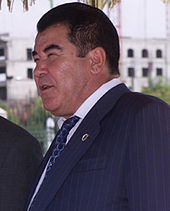Saparmurat Niyazov
Saparmyrat Ataýewiç Nyýazov [θɑːpɑːrmyːrɑːt niːjɑːðɒv] (Russian Сапармура́т Ата́евич Ния́зов Saparmurat Atayevich Niyazov; * 19. February 1940 in Gypyak near Aşgabat, Turkmen SSR, USSR; † December 21, 2006 in Aşgabat, Turkmenistan) was a Turkmen politician and the first President of the independent state of Turkmenistan from 1992 until his death. During this time he called himself Türkmenbaşy (also Turkmenbashi, German: Führer der Turkmenen).
Nyýazov grew up an orphan after his father died in World War II and his mother in the 1948 Aşgabat earthquake. While studying in what was then Leningrad, he joined the Communist Party of the Soviet Union and rose rapidly through the party hierarchy upon his return to the Turkmen SSR. In 1985 he became General Secretary of the Communist Party there, and in 1990 he was elected President in the first presidential election in the Turkmen SSR as a Communist Party candidate. Supported by the existing power apparatus, Nyýazov was able to assert himself as head of state after Turkmenistan's independence in 1991. In the 1992 presidential election, he was elected president of Turkmenistan unopposed. In a referendum in January 1994, the presidential term was extended from five to ten years, and in 1999 the Turkmen parliament finally appointed him president for life.
Under Nyýazov, Turkmenistan developed into one of the most repressive states in the world, where human rights were systematically violated. The authoritarian rule of the president was characterized by a dissolute personality cult around Nyýazov and his family, and any form of opposition to the president was suppressed by the state security apparatus. The education, health, and social systems in Turkmenistan were weakened during Nyýazov's presidency by austerity measures and a strong centralization on the capital Aşgabat, which resulted in increased poverty and reduced life expectancy for the Turkmen rural population. In foreign policy, Nyýazov pursued the concept of permanent neutrality, which was intended to prevent external influence on political developments in Turkmenistan.

Saparmyrat Nyýazow (2000)
Youth and studies (1948-1970)
After the death of his mother, Nyýazov initially grew up in an orphanage, later living with distant relatives. In 1957 Nyýazov completed his schooling and then went to Moscow, where he studied at the Moscow Energy Institute in the field of energy engineering. However, after the first semester he returned to the Turkmen SSR at the beginning of 1958. There he worked as an instructor for the Union of Mineral Exploration Workers before taking up a second course of study in Russia in 1960, this time at the Polytechnic Institute in what was then Leningrad. While studying engineering, he met his future wife, Muza Melnikova, a Russian from a Jewish family. He also joined the Communist Party of the Soviet Union in 1962. In 1967, he graduated from Leningrad with a degree in engineering and then returned to Aşgabat. From 1967 to 1970, he worked at a power plant in the city of Büzmeýin, northwest of the Turkmen capital. In parallel, he continued his involvement in the Communist Party in Turkmenistan.
Career in the Communist Party (1970-1992).
In 1970, Nyýazov left his previous employment and became more active in the Communist Party. As one of the few ethnic Turkmens with a degree in engineering to pursue a career in the Turkmen CP, Nyýazov's rapid rise to the party's leadership cadre was made possible. In addition to his background and studies, his reputation as an efficient apparatchik and his ability to form political alliances favored his rapid rise in the party. From 1970 to 1975, he served as a Turkmen CP instructor in transport and industry before rising to become deputy head of the Department of Industry in the Turkmen CP in 1975. After attending the Higher Party School in Tashkent in 1976, he returned to Aşgabat, becoming head of the same department in 1979 and chairman of the CP Party Committee in Aşgabat in 1980. From 1984 Nyýazov was an instructor on organization and party work in the CPSU. In August 1985, an article in the Party newspaper Pravda described shortcomings in the Turkmen cotton economy and criticized the leadership of the Communist Party in Turkmenistan. This article gave Mikhail Gorbachev, General Secretary of the CPSU Central Committee since March 1985, the opportunity to reshuffle the party leadership around General Secretary Mukhamednazar Gapurov, which was considered corrupt and inefficient. On December 21, 1985, Gapurov was officially deposed, and Nyýazov succeeded him as chairman of the Turkmen party organization. Nyýazov was also a member of the CC of the CPSU from 1986 to 1991 and a member of the Politburo of the CPSU from 1990 to 1991.
In the first presidential election in the Turkmen SSR on 27 October 1990, Nyýazov was the only candidate to become the first president of the Turkmen SSR with more than 98% of the vote. Nyýazov was critical of Gorbachev's reforms and reacted with a strictly structurally conservative course in the Turkmen SSR. He supported the August coup in Moscow in 1991, but quickly adapted to the political situation after the failure of the coup and the increasing disintegration of the Soviet Union and pushed for Turkmenistan's independence. Upon official independence on October 27, 1991, Nyýazov became the first head of state of the independent state of Turkmenistan. On 16 December 1991, the Communist Party of Turkmenistan dissolved and merged with the Democratic Party of Turkmenistan (DPT), founded on 3 March 1992 under Nyýazov's leadership.
Search within the encyclopedia